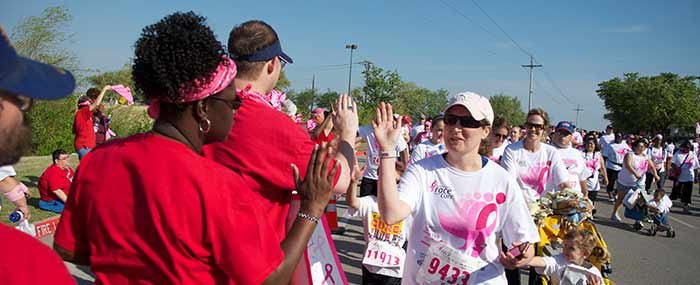Last weekend, Walnut Hill Park in New Britain, Connecticut, was awash in pink for the annual Race in the Park, on behalf of breast cancer research.
Throughout the event, breast cancer survivors were honored with a special breakfast, mini manicures, chair massages, and other amenities celebrating their courage and perseverance in battling this disease.

The good news is, since 1990, more and more women are surviving a breast cancer diagnosis. The bad news is, many survivors continue to wrestle with feelings of anxiety, fear, and other distress requiring psychological intervention and care.
That’s why I wanted to share a recent study that focused on which approach could be more helpful to breast cancer survivors in managing symptoms of depression, trauma, and pain.
Survivors of stage I to III breast cancer were randomly assigned either a mindfulness-based cancer recovery group, (MBCR), a supportive-expressive therapy group (SET), or a 1-day stress management seminar (SMS), intended to serve as a control group.
Those in the MBCR group participated in 8 weeks of training in mindfulness practice that was patterned after mindfulness-based stress reduction (MBSR). Those in the SET group participated in 12 weekly group therapy sessions facilitated by therapists.
Linda E. Carlson, PhD and researchers at the University of British Columbia measured both psycho-social outcomes for the two treatment options, as well as stress-related biomarkers.
In addition, since abnormal cortisol profiles have been connected to both poorer psychological functioning and shorter survival time in several types of cancer, researchers measured cortisol levels in the saliva of participants. Carlson and her team wanted to see whether or not they could find objective biologic results in response to the two therapeutic options.
Okay, now on to the results.
Although both types of treatments showed clinically meaningful improvements in both patient-reported outcomes as well as in the cortisol profiles, the results showed superior improvement among those in the MBCR group.
Participants who received training in mindfulness showed a greater decrease in symptoms of stress and an overall improvement in quality of life and social support.

Now, this study was limited to survivors of breast cancer only, so similar results couldn’t necessarily be generalized to other types of cancer or disease. And I’d also be interested in seeing additional research regarding the long-term benefits of MBCR for breast cancer survivors.
If you’re interested in reading more about this study, you can find it in the Journal of Clinical Oncology, Volume 31, September, 2013 issue.
When I think about all those strong, courageous breast cancer survivors who were celebrated in the park last weekend, I’m grateful to see this kind of research acknowledging the potential for mindfulness practice in helping them achieve greater health and wholeness.
How about you? How have you seen mindfulness training used to complement recovery after serious illness or injury?
And, do you know any breast cancer survivors you’d like to acknowledge? Maybe you could share this post with them. If so, be sure to let me know in the comments below.
My sister-in-law, with breast cancer and brother, with bladder cancer were both diagnosed within a week of each other, in June 2008. They joined a support group called InspireHealth in Vancouver, Canada, now supported partially by our provincial government. They are an integrative cancer agency promoting stress-reduction (meditation, visualization/relaxation, laughter yoga, nutrition, massage, Reike, counseling, etc.) Unfortunately she passed away, and I started attending, as my brother’s support person, in February, 2011. As a Type A person, I was so happy to be introduced to mindfulness meditation and relaxation/visualization, which we attended every Tuesday morning and afternoon…it has made so much of a difference in my life.
Little did I know that I would be diagnosed with squamous cell carcinoma in Nov. 2013. It was a Marjolin’s Ulcer which grows in burn scar tissue, first evidenced by a bike wound in my shin that did not heal for over a year, with treatment by many doctors. Finally, after correct diagnosis, which included two different microbes, which had also invaded the area, I had it removed by Moh’s procedure, by a wonderful plastic surgeon at the Sin Care Agency.
What is interesting is that I, at no time, felt any anxiety, fear, once the cancer diagnosis was made…actually I felt relief and curiosity, and a sense of, “Now I am the same as everyone else in my family”, and can get on with treatment. The mindfulness meditation and relaxation helped me in so many ways, but even more the cancer survivors in the meditation groups were amazing models…each week people came in pain, or with difficulty in getting to the clinic, but each time exhibited such an appreciation for how they felt at the end of the session (no pain, no anxiety, calmness, and a great love and sense of caring for each other, and the leaders, developed in the group). I cannot say enough about treating the whole mind and body. After being quietly housebound over Christmas, I have an even greater appreciation for friends, family, my life and the role the calming of “monkey-brain” plays in my life.
I am an invasive breast cancer survivor- diagnosis in 2002. I had a breakdown when diagnosed and lived in almost constant state of terror for some years after. There was no alternative to hearing my prognosis – 60 % that it would return within 5 years. I’m only just able to contemplate mindfulness in the past 2 years, as before that I’d be flooded with the terror and panic. I’m not sure what may have helped, except that being more mindful when panic feels real wasn’t helpful for me! I do now use mindfulness.
Karen, first, I’m glad you are 12 years out from cancer. I’m wondering what stage was your cancer, and did you have a double mastectomy? I also was diagnosed with invasive (infiltrating) breast cancer, lobular carcinoma. I’d had a mammogram July 1,2011, and Dec. 22, 2011 felt a huge lump in my right breast. Another mammogram still couldn’t determine anything. Many other tests, needle biopsy and breast MRI’s later, got the diagnosis of Stage III. I was told that this type of cancer was infamous for reoccurring, so I decided on a double mastectomy. Hearing you’ve survived 12 yrs gives me even more hope that I’ve beaten cancer. Went through all the standard treatments- 2 rounds of chemo, surgery, 33 rounds of radiation.
I learned of mindfulness while in the midst of treatment. It was difficult to quiet my mind from “catastrophizing” and I’ve suffered from depression and anxiety my entire adult life. I haven’t had a class, group or specific therapy in mindfulness, but try to stay “in the moment.” It was difficult to practice. Eventually it helped me get through what I thought I could not endure- especially the radiation. I’d say to myself, “I can get through this present moment.” I live in a rural area, and wish the facility that treated my cancer would have treated the rest of me…emotional, social, psychological, whole body/person. Perhaps helpful pamphlets/books have been written about the topic, but I’ve come up with an acronym for ideas I’ve jotted down in my journal during & after my treatment:
PACE, which stands for PATIENT centered ACTION plan for CANCER patients with (i.e.who have previous to cancer had diagnosis & been treated for) EMOTIONAL and mental health issues. I found that the pace treatment has to go by is fast and furious, and at times I had to stop the crazy speed and let them know I couldn’t handle the pace with which everything was roaring by. If I needed a short break, then I truly needed a break to let my head catch up to all that was going on. I may write a brochure or book from a patient’s perspective of how PACE could better help not only people with mental illness, but include patients who suddenly face a cancer diagnosis and the fragility of each patient.
Besides writing, I took a class called “Healthy Living Through the Arts” and discovered my inner visual artist while my dominant hand was laid up in a partial cast. Using my non-dominant hand to paint actually became an abstract depiction of my cancer journey. I continued on using chalk and paints after the class concluded, and found it calmed me and the process of doing art brought me to a place of peace, calm…like time stands still in a very good way. I believe that also awakened my songs writing abilities that had lain dormant for many years, and wrote a song about going through and surviving cancer. Whew! Didn’t think I’d write this much, so thanks for listening, and again, best wishes to you and all the survivors who may read this. Namaste.
Interesting outcomes. I would be curious to know who facilitated the Expressive Arts groups, whether they were Registered/Certified Art Therapists, and what approach to Art Therapy was utilized. There are multiple approaches including Focusing Oriented Art Therapy, Mindfulness Based Art Therapy, Phenomenological Art Therapy, concepts of the Expressive Therapies Continuum and Media Dimensions Variables which draw (and paint, and sculpt, and write, and more…) from principles quite parallel to those of mindfulness based meditation.
I am a 30 year survivor from Germ Cell Ovarian Cancer and a 5 year survivor after breast cancer treated with a lumpectomy and radiation. Embedded in the whole experience has been Major Depression treated successfully with antidepressants. I feel I inherited the depression tendencies from my Father and probably have had the tendencies all my life that was intensified by Mother’s death just as I began my chemotherapy treatments.
I didn’t know it was mindfulness, but in my quest to understand the endless “why’s” I have practiced many of the strategies suggested and affirmed in my own thinking by the impressive list of professionals you have interviewed about the subject. I was told I was cured of the ovarian cancer (because it was germ cell) at the completion of my treatments but I knew I was not “whole”. In truth, I was an emotional mess with no clue as to how to get better so I became a seeker. My experience seems to have run parallel to the emerging research and new understandings of spirituality, grief and mind-body health that have emerged over the years.
The short version of a long story is that when I was diagnosed with the breast cancer some over five years ago, I was amazed at the inner peace I felt because of all the inner work I had done. It certainly wasn’t easy but it sustains me every day. I particularly thank Joan Borysenko for her book on Mind the Body-Mend the Mind but I can assure you I have connected a lot of “dots” and been affirmed by each one of your fellow professionals in one way or the other. THANK YOU ALL!!/Orla Nelson
my wonderully inspiring cousin just had her 5th treatment yesterday,, ii am so so proud of her,,,
i KNOW she willl survive,,, she has been a trooper all her hard live and i know she will beat this,,, O how i love her,,, AND her family!!!!
GO CHARLOTTE!!
ps she could use donations for a garage sale she is having to raise the money for her bill… contact me
This is what we need – an insight to make eveoyrne think
i have developed a mathematical protocol (algorithm, in fact) which has successfully treated ovarian cancer as having an etiology connected with cognitive self-misperception (survival 10+ years). You may call me at my home (North American time zone: GMT-6h = NYC-1h), at (204) 896-4967. Good luck! /Arthur